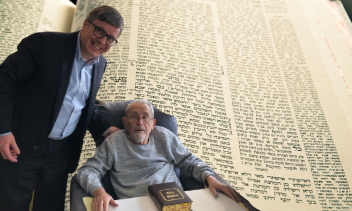How can we cultivate a language of loss?
This is a question that haunts, traps, and limits many of us. There is something about grief and mourning that leaves us without words, trapped somewhere between silence and speech. We are not sure what to say, and yet equally unsure how to be silent. Uncomfortable in speech, uncomfortable in silence, we struggle to find a language of loss, a way of navigating between the Scylla of silence and the Charybdis of speech.
It was that most profound of traumas, the Holocaust, that led poets and philosophers, those on the front lines of language, to rethink the very meaning and capacity of language. Theodore Adorno (1903–1969) famously put it this way: “to write poetry after Auschwitz is barbaric,” a line that itself has ironically prompted an astounding amount of poetry as people have worked to come to terms with the impossibility of speech, of art, and the equal inability to express pain, suffering, and loss through silence alone.
Many choose silence. This is a most honest response, one enshrined in our tradition as the response of Aharon, after the death of his sons, and later codified by 20th-century poets in their own way. Consider Zelda:
From one end of the world to the other
rove the songs
of every people and language.
Parables and signs come;
the good smell of distances
emanates from them
if on their way they did not touch
the stench of standing water
or blood.
These opening lines tell us that language, song, and symbols all travel the world, but there is something often amiss about them. There is a “good smell of distances” that “emanates from them,” if they were not touched by the suffering of this world (“the stench of standing water / or blood.”). Language and song that have not touched pain leave us missing something.
Zelda ends with powerful words:
But the finest of all the songs
is the white curtain
in which is embroidered with a white
thread:
“Silence is Your praise”
These words are not silence, we realize, but they are threaded through with it. If silence is one response, another is words that have touched the pain. People of my generation grew up with a profound amount of Holocaust memoirs, testimonies, narratives, movies. This is also a remarkable response, one that takes great courage and that is fraught with vulnerabilities. Perhaps one’s suffering will not be able to be communicated, perhaps it will sound cheap or cliche, perhaps one’s memories will be mistaken or disproved. The validation we seek is often too much for our listeners, and fated by this mismatch, we repeat our account again and again, seeking relief, each time our words mattering more and less. This is spoken to in Coleridge’s “The Rime of the Ancient Mariner,” in which the lone survivor of a naval accident travels through life repeating the account of his tragedy over and over again. And so the path of words also has its dangers.
The challenges of silence and speech led to middle paths. Elie Wiesel, along with so many others, chose fiction as his medium. This path offers the engagement with suffering of words, but it is protected by the intentional obfuscations of fiction. Wiesel’s writings blurred truth and non-truth, with an ever-constant meta-commentary on how these two words are always blurrier in pain than in joy.
Another middle path was walked by Paul Celan. A Romanian-Jewish German-language poet, Celan wrote poetry after the Holocaust that is infected (or broken?) by the rupture in meaning and language that he suffered during the war years, resulting in a sort of poetry that is somehow both nonsensical and deeply painful (“blessed art thou / No One / In thy sight would / we bloom / in thy / spite.”). Celan, like many others of his time, struggled also with the very languages he chose to write. Could he write in German, after the Holocaust? What other choice did he have? His most powerful pieces littered with the detritus of language.
In our own lives, the experience of loss is equally complicated by the language that we use—grief, mourning, loss, each has its own flavor, scent, feeling to it. Loss is somehow the most ambitious, the most vague term of all, and yet also the most precise. Loss: as in lost, something that will yet be found, returned? (According to etymonline.com: lost c. 1300 “wasted, ruined, spent in vain,” and also “no longer to be found, gone astray.”) Loss speaks to the empty space now in our lives, the impossibly full emptiness, the empty seat at the table, unoccupied bed, empty shtetls and shuls. This absence dwells in our communications about loss as well, as we struggle to articulate what loss is to us, and our love for those who are experiencing loss.
This challenge faces the very words we choose when discussing the losses of our life. On a national level, we speak of Churban, Shoah, Holocaust; each word is complicated with long histories of those who choose to use or not use one or several of these terms, each with its own challenging set of feelings and emotions associated with it. (The poet Jerome Rothenberg, in his book Khurbn, says this about the word Holocaust: “It was a word with which I never felt comfortable: too Christian & too beautiful, too much smacking of a ‘sacrifice’ I didn’t & still don’t understand. The word with which we spoke of it was the Yiddish-Hebrew word, khurbn [khurban], & it was this word that was with me all the time we stayed in Poland.”)
How might we develop a language of loss? Rabbi Josh Grajower, in his touching conversation with 18Forty about the loss of his wife, Dannie Grajower, speaks of the importance of therapy in the process of grief, to learn a language of loss for one’s loved ones, one’s children, and one’s self. A qualified therapist can help one develop a realistic and meaningful language of loss.
The 9th of Av, a day marked by a long and profound history of loss for the Jewish people. On this day, the Jewish people honor the profound losses that they experienced as a nation, and as individuals, from the beginning of the Jewish story to today. There is an emptiness at the heart of the 9th of Av, as we honor that and those who are no longer with us. In fact, some commentators see in the Hebrew word for the 9th of Av (Tisha) a reference to the Hebrew word for forgetfulness, weakness, displacement (n-sh-y), as we struggle as a people to come to terms with the loss at the heart of our lives. Today, some of us will engage with loss through liturgy, through poetry and prayers, seeking the absent through words. There is also a tradition to refrain from casual conversation on the 9th of Av–perhaps a way to embrace the subtle silence of loss.
We have nothing to say, have had nothing to say, and yet our year has been complicated by endless speech as we run from silence. Today, we are embracing the language of loss, as we try together to find a way towards meaningful engagement with the losses of our lives. Let’s close with the words of Mark Jarman, from his “Five Psalms,” in hope that we might all find the right words:
First forgive the silence
That answers prayer,
Then forgive the prayer
That stains the silence.








